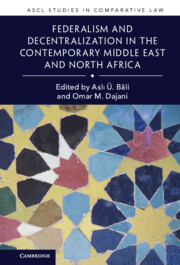Book contents
- Federalism and Decentralization in the Contemporary Middle East and North Africa
- ASCL Studies in Comparative Law
- Federalism and Decentralization in the Contemporary Middle East and North Africa
- Copyright page
- Contents
- Contributors
- Acknowledgments
- 1 Introduction
- Part I Theoretical and Comparative Context
- Part II Decentralization and Governance Reform
- 6 Decentralization, Ideology, and Law in the Islamic Republic of Iran
- 7 Salvaging State Legitimacy in Iraq through Decentralization
- 8 Decentralization Reforms in Post-Revolution Tunisia
- Part III Decentralization and Self-determination
- Part IV Decentralization, Conflict, and State Fragmentation
- Part V Conclusions
- Index
7 - Salvaging State Legitimacy in Iraq through Decentralization
from Part II - Decentralization and Governance Reform
Published online by Cambridge University Press: 15 January 2023
- Federalism and Decentralization in the Contemporary Middle East and North Africa
- ASCL Studies in Comparative Law
- Federalism and Decentralization in the Contemporary Middle East and North Africa
- Copyright page
- Contents
- Contributors
- Acknowledgments
- 1 Introduction
- Part I Theoretical and Comparative Context
- Part II Decentralization and Governance Reform
- 6 Decentralization, Ideology, and Law in the Islamic Republic of Iran
- 7 Salvaging State Legitimacy in Iraq through Decentralization
- 8 Decentralization Reforms in Post-Revolution Tunisia
- Part III Decentralization and Self-determination
- Part IV Decentralization, Conflict, and State Fragmentation
- Part V Conclusions
- Index
Summary
Iraq’s post-2003 political order has experienced unremitting turbulence despite the end of Saddam Hussein’s dictatorial regime. While federalism was seen as a means to safeguard against the reemergence of authoritarianism, the rationale for decentralizing central authority, beginning in 2015, can be viewed primarily as an attempt to salvage state legitimacy by addressing governance issues amid growing popular disenfranchisement and the violent onslaught of so-called Islamic State. But the decentralization process has failed to achieve its desired results, namely, enhancing local service provisions and improving state–society relations. Meanwhile, contestations over the powers and authorities of national and subnational entities have exacerbated political tensions. Ensuring that decentralization contributes positively to state legitimacy rather than undermining it first requires addressing the underlying structural flaws. This includes improving the competence and expertise of local administrative units, enhancing accountability and anti-corruption mechanisms, introducing electoral reforms that can temper political intransigence, and recalibrating international assistance efforts.
Keywords
- Type
- Chapter
- Information
- Publisher: Cambridge University PressPrint publication year: 2023



